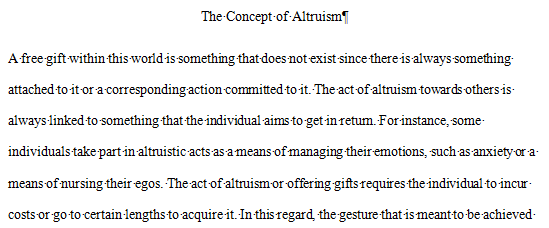
Does true altruism exist in nature? If so, what would true altruism look like?
The Concept of Altruism
Prompt:
Scholars have debated and deliberated over the concept of altruism (self-less concern for the well-being of others) for centuries. Does true altruism exist in nature? If so, what would true altruism look like?
Let’s consider chimpanzee behavior. Chimps are known to help out friends in need. By helping out a friend, a chimp can expect that the friend will help him or her during a time of need, as well. Individuals that have invested friends are probably more likely to survive. The act of helping another benefits both individuals…but when would it be classified as self-less or self-interested?
Let’s also consider the social custom of gift-giving. What are the consequences of not reciprocating? Are there bonds of ? Is there some competitiveness involved in gift giving? How do we feel when we haven’t received a nof at least equal value? What if the gift received is of higher value?
Consider the examples and questions above in your discussion.
Q: Is there such thing as a free gift?
Answer about 8 sentences
And comment on 2 other students posts for about 5 sentences each.
Student 1:
I think there is no real altruism in nature, and there are no free gifts in the world. For example, a sample of “free collection” perfume is written on the counter of the shopping mall; this is just a marketing method. The purpose of the brand is just to get customers who have received perfume samples back to the store to buy a bottle of expensive perfume with the same taste. This way cannot be called “altruism” because the original intention of the brand is not just to give away free perfume but also to obtain greater benefits. I think that a gorilla helping a friend is not altruistic, because helping others means helping himself. If the gorilla faces a struggle for survival in the future, its chances of survival will increase. It is customary in society for people to give gifts to each other at festivals. But when the value of the two escorts is not equal, the person receiving the less valuable gift may assume that the other person is not treating him or her as a best friend. However, gifts to each other can never be of equal value, and the person who receives the higher value of the gift will get along with his friends with a sense of debt. Therefore, the custom of gift-giving is no longer a way of expressing one’s heart, but it becomes a way of breaking the balance of friendship. There is no real altruism in society because people are not willing to owe anyone, so people are used to rewarding others’ contributions.
Student 2:
I don’t think the idea of “free gifts” exits. As humans, I think everything we do have some level of self-interest. We are motivated by our desires and feel satisfaction when we are able to fulfill these desires. Assuming that we have a good relationship with someone, and we want to continue to maintain this good relationship, we would want to send them good gifts or maybe one that is even better than the one we’ve received. Some of us may do this out of respect and admiration because of the guilt we feel when we don’t put in the same, if not more, amount of effort than they do (making gift-giving a way to maintain one’s image to appear good to others). I think the act of “gift-giving” is also competitive in nature, as sometimes we’d want to “one-up” the other to show them that we’re capable of giving better, more extravagant, gifts. Considering that “the act of helping another benefits both individuals,” having this idea in mind led me to realize that maybe we give gifts that are better than the ones we receive so that we can receive something even better in return. So no, free gifts don’t exist since we’d always gift something in return. Unless we choose not to of course. All of this tells me that we are somewhat self-interested in nature.
8 hours ago
REQUIREMENTS
Deanza college
Answer preview…………………..
 apa 504 words
apa 504 words